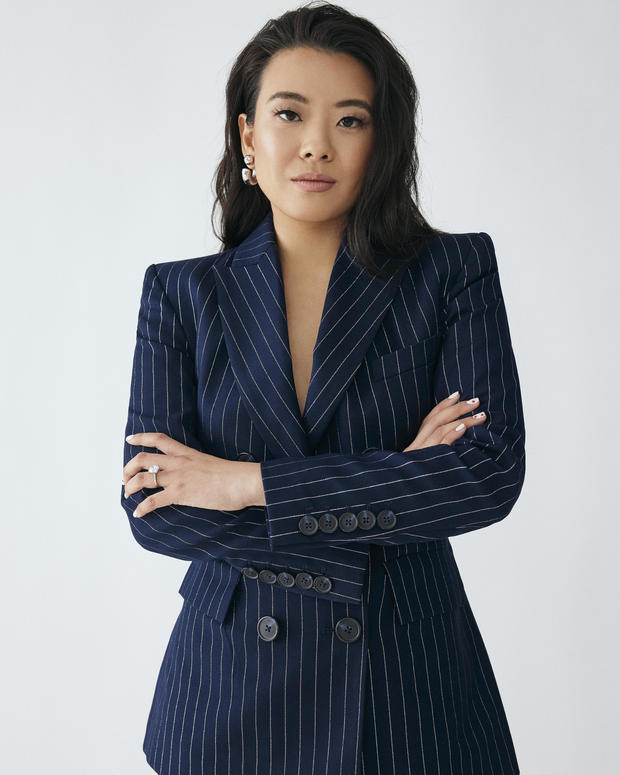A top personal finance influencer wants young adults to stop making these money mistakes
Your Rich BFF founder Vivian Tu has quickly emerged as one of the most prominent personal finance influencers, with millions of followers on Instagram, TikTok and other social media platforms. A former Wall Street trader, the 30-year-old shifted gears after noticing that many of her coworkers from the corporate world needed help even with basic financial tasks.
Through Your Rich BFF, she now offers money advice to millennials and Gen-Zers in the places they like to get information — on social media, while also publishing a book, "Rich AF," hosting a podcast and appearing on television. In an interview with CBS MoneyWatch, she dispels common money myths and outlines some financial mistakes younger adults often make. This interview has been edited for length and clarity.
CBS MoneyWatch: How did you get into this line of work, and what made you think it could become a full-fledged career?
Vivian Tu: I was surprised that people who were older than me or more advanced in their careers did not know the answers to questions like, "Can you help me rebalance my 401k, pick a health insurance plan, and understand if my company stock options are worth anything?" I was asked the same questions over and over again, so I created content to answer them so people would stop asking me!
It turned out that a lot more people than just my coworkers needed information. We don't get this in school, and it's the one thing all of us desperately need. We would all be a lot better off if this were part of our education.
So where can people learn how to be smart about money?
Similarly to how you hold a pencil or learn to drive — you are taught by your parents and guardians. For some folks who come from generational wealth or have parents who are money-savvy, they're getting that education.
However, the vast majority of us don't come from that type of background. Our parents are imperfect, and they are imperfect with their money as well. So we pick up the same money issues our parents have. Then you turn to the internet to try to find the information yourself.
What's wrong with finding information online?
There are a lot of myths out there, especially on social media. One big myth is that investing is very exciting. It's not. It's watching grass grow or watching paint dry. If you're feeling like you're on a roller coaster, your heart rate is rising, you're excited, nervous, you're probably doing it wrong.
Investing is a great way for any person to have a dual-income household. You're working hard for money, and your money can work hard for you. You can only work so many hours before your body and brain give out, but your money can work around the clock 24/7, with no lunch breaks. At the start of your career, the hope is you are setting aside money and it will help you when you don't want to work as much or you can't.
Right. And at a recent Wall Street Journal event you noted that the algorithms that power social media can magnify content that is misguided, and even financially reckless, like "get rich quick" schemes. How do you make plain-vanilla investing principles appealing for the TikTok generation?
In terms of getting people to actually care, I think it's showing what that money actually looks like when it's in use. Instead of saying if you save now, you get to retire a multimillionaire at 65, say, "At 65, you get to wake up every morning, have a lemonade, hit the golf course, live in Naples, Florida — you get to live every day without being beholden to the need to make more money." That's more compelling than just the stats.
Meeting people where they are at, explaining why money things are important to them, moves the needle. For example, when I talked about how having a good credit score helped me earn travel rewards that I used to fly to Italy in a lay-flat seat, everyone wanted to know how to improve their credit scores. Showing responsible decision-making paying off is when people are going to actually pay attention.
What are some other money myths you think need to be debunked?
No. 1 is thinking you need to be entirely debt free. Yes, eliminate as much high-interest debt as possible, but when you have low-interest rate debt, you don't need to rush to pay it off. You can start investing while paying off debt. Not all debt is evil.
No. 2 is, don't buy things you don't need with money you don't have to impress people you don't even like. When you make a purchase, ask yourself, "Do I want to have this, or do I want people to know I have this?"
Third, investing is not only for rich people. It's how rich people get rich. The best outcomes for average investors are buying and holding exchange-traded funds and mutual funds that track broader indices. It's about having a very diversified portfolio that is appropriate to your age and risk tolerance.
It's not what people want to hear, — they want to get rich tomorrow. If your horizon is 24 hours, there are very few investments that are ever going to pay what you need it to.
A hallmark of personal finance advice is that the choices we make as individuals determine our financial futures. But that view doesn't take into account the systemic forces that shape our financial lives, like income inequality and recurring economic crises. More recently, for example, we're seeing how the advent of artificial intelligence can suddenly transform some jobs. What's your take?
We have to come to the realization that our generation can't save our way to riches — we don't get to have the "happily ever after," white picket fence house our parents had through saving. Back in the day you could work a middle-class job, earn a middle-class paycheck, buy a home, and go on vacation twice a year. It's harder now. But you have to be able to do the best with the hand you are dealt. Control what you can control and if something happens, know how to pivot.
For example, if you just earned a degree in programming and are worried about AI taking over these jobs, dive into learning how to work with AI and see how you can maintain job security. There will always have to be someone there to make AI smarter, design the system and be the engine behind it. It's not like it just exists. We need to learn to use it to our advantage versus compete. It should be a collaboration. Why not leverage it to take over the 25% of the job that you hate so it frees you up to do other things?






